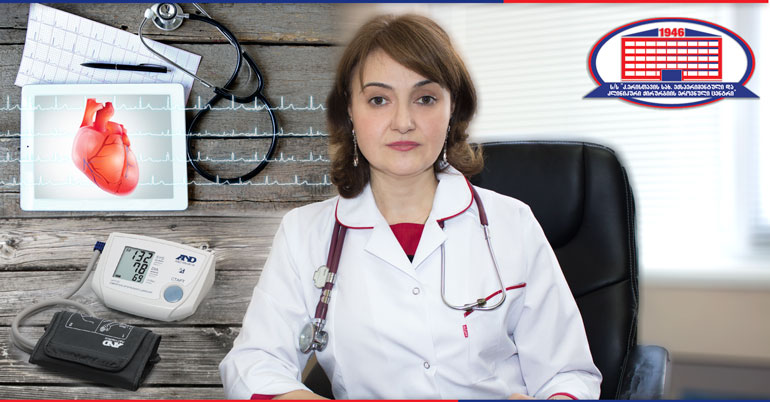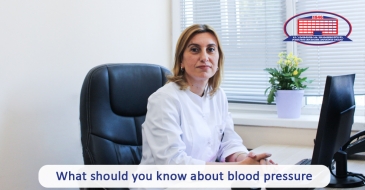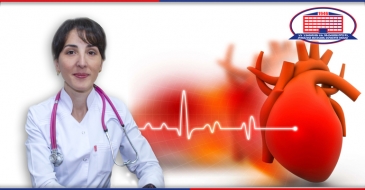
Arterial hypertension is often called "a silent killer."
This name really corresponds, because it doesn’t show symptoms until the body is harmed. Arterial hypertension is a risk factor for the development of the heart, brain, kidney and vascular diseases.
People over 50 should pay special attention to this, because arterial hypertension has a high frequency of manifestation at this age, and rarely can bother people younger than 30 years.
Arterial hypertension, as well as other cardiovascular diseases, is characterized by the seasonal exacerbation. These periods are spring and autumn.
It is important to identify the symptoms and regulate the blood pressure because this makes it possible to prevent life-threatening diseases, stroke, and infarction.
Lika Khosroshvili, the cardiologist and medical doctor of the National Center of Surgery is talking about this issue.
- What is arterial hypertension?
- "pressure" is a popular name, and in the medical language, an arterial hypertension is defined as an increase of "upper" and "lower", or systolic and diastolic pressures above the normal range. Two types of arterial pressure are distinguished: the first Essential, or idiopathic hypertension, which occurs in 90-95% of cases and secondary (symptomatic) related to the damage of organs and systems that directly affect the level of blood pressure. The classification of secondary hypertension is as follows: renal, endocrine, neurogenic, hemodynamic (cardiovascular, mechanical) and others. In this case, the elimination of etiologic or pathogenetic factor leads to the normalization of blood pressure.
- What causes arterial hypertension and how is it possible to regulate the pressure by the diet?
- The cause of the hypertensive disease is not fully established, but it is important to merge the hereditary predisposition with other adverse effects such as excess weight, nervous stress, consuming a large amount of salt, alcohol, cigarette, diabetes mellitus, increased blood cholesterol levels, etc. The diet of hypertensive people should consist of fruits and vegetables. It is better to eat magnesium, calcium, potassium-rich food, low-fat dairy products, and food rich with vegetable oil. You should also control the quantity of the received and excreted fluid.
- What are the symptoms of hypertension?
- Most uncomplicated hypertension is asymptomatic. The symptoms associated with hypertension are a headache, noise in the ears, dizziness, general weakness, heart palpitations, difficulty breathing, blurred vision, drowsiness, numbness of limbs. It is often manifested with the nosebleed. Arterial hypertension increases the risk of stroke, infarction, and heart failure.
- How do you treat arterial hypertension at the National Center of Surgery?
-Before starting the antihypertensive treatment, the following studies are carried out at the National Center of Surgery: ECG (Electrocardiogram), urinalysis, CBC (complete blood count), coagulogram, glucose in the blood –before breakfast and 2 hours after meal, determination the level of potassium, creatinine, lipid spectrum in blood, echocardiography, if necessary holter monitoring for 24-hours and blood pressure monitoring. On the basis of these studies, two or more antihypertensive medications of various groups are prescribed to achieve targeted blood pressure. Regulating blood pressure with one medication is effective approximately in 30% of patients. Antihypertensive medications (thiazide diuretics, ACE-inhibitors, beta-blockers, calcium channel antagonists, angiotensin II receptor blockers) not only regulate the blood pressure but at the same time, they prevent the development of cardiovascular diseases.
- Can you tell us about the ranges of normal pressure and what is hypertension?
- TA 119/79 mmHg is considered as a normal blood pressure;
When the blood pressure numbers exceed 140/90 mmHg it is already a hypertensive disease.
However, in case of chronic diabetes or chronic renal impairment, an arterial blood pressure 130/90 mmHg and above is already hypertension.
National Center of Surgery address – Tbilisi, Digomi Chachava street N5.
You can contact the Call-center of the National Center of Surgery at 577 11 91 19 or 2 02 25 25;
If you have some questions, you can contact the cardiologist of the National Center of Surgery Lika Khosroshvili at 577 37 33 35;
Wish you health!








